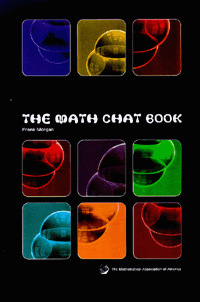- About MAA
- Membership
- MAA Publications
- Periodicals
- Blogs
- MAA Book Series
- MAA Press (an imprint of the AMS)
- MAA Notes
- MAA Reviews
- Mathematical Communication
- Information for Libraries
- Author Resources
- Advertise with MAA
- Meetings
- Competitions
- Programs
- Communities
- MAA Sections
- SIGMAA
- MAA Connect
- Students
- MAA Awards
- Awards Booklets
- Writing Awards
- Teaching Awards
- Service Awards
- Research Awards
- Lecture Awards
- Putnam Competition Individual and Team Winners
- D. E. Shaw Group AMC 8 Awards & Certificates
- Maryam Mirzakhani AMC 10 A Awards & Certificates
- Two Sigma AMC 10 B Awards & Certificates
- Jane Street AMC 12 A Awards & Certificates
- Akamai AMC 12 B Awards & Certificates
- High School Teachers
- News
You are here
Frank Morgan's Math Chat - World Series
 |
 |
December 6, 2001
OLD CHALLENGE (Al Zimmermann). In the baseball World Series (best of 7), which should be more difficult: to come back from being behind 0-2, or to come back from being behind 2-3?
ANSWER (Jonathan Falk, John Shonder). It depends on whether our probability p of winning a game is greater than or less than about 64%. At p = 64.04%, our probability of a comeback is 41% in either scenario. If p > 64%, we prefer the longer series following 0-2. If p
Here's the computation. Let p denote the probability of winning, so 1-p is the probability of losing. The probability of coming back from 2-3 (by winning two games in a row) is exactly p2. The probability of coming back from 0-2 is p4 + 4 (1-p) p4, since we must win four games, either consecutively (probability p4) or also losing one game (probability (1-p) p4), which can happen four ways (losing the third, fourth, fifth or sixth game). These two probability formulas are equal when p is (1 + â??17)/8, about 64%.
Incidentally, in one of the problems in his new book "Duelling Idiots and Other Probability Puzzlers," Paul Nahin calculates the probability that the World Series will require 4, 5, 6 or 7 games. He shows that over the years, the proportions are almost exactly what we would expect for two evenly matched teams. Thus p should probably be equal to 0.5 in the above equations, and it is harder to come back from 0-2.
Joseph DeVincentis agrees, pointing out that even the best major league baseball teams win only about 70% of their games when competing against a broad mixture of teams, good and bad, from across the league. (Seattle, which set a record this year with 116 wins, won only 71.6% of its games.) The teams that make it to the World Series are presumably somewhat better than the average, and so should be expected to be more evenly matched than a 64% chance of one team winning any given game.
A number of respondents mentioned other important factors, such as the home field advantage.
QUESTIONABLE MATHEMATICS. Eric Brahinsky reports that in the comic strip Foxtrot, a football quarterback about to hike the ball goes:
Hutt one! Hutt two! Hutt three! Five! Seven! 11! 13! 17! 19! 23! 29! 31! 37! 41! 43! 47! 53! 57! 61! 67! .... And Deion Sanders thought HE was Prime Time!
Including 1 as a prime is an error of convention, but including 57 = 3 x 19 is a serious error. The cartoonist probably meant instead to write 59, which is prime.
Michael Benedict (Quincy High School Mathematics Department) spotted this report on the Brazilian soccer star Pele in the Wenatchee World (Wenatchee, WA) newspaper in October:
"During a 1957-1977 career, Pele played in 375,000 games and scored 281,000 goals."
There are about 7300 days in 20 years. This means that Pele would have to average approximately 51 games per day to achieve this kind of feat!
And then there's this quote submitted by Howard Waldman:
"We're going to turn this team around 360 degrees."
--Basketball star Jason Kidd, after being drafted to the Dallas Mavericks.
Of course, 360 degrees just brings you right back where you started.
Readers are invited to submit more examples of questionable mathematics.
PUTNAM EXAM. The notorious six-hour Putnam Exam contest for American college students was held last Saturday. The median score is often 0. For more information, including questions and answers, see http://www.math.niu.edu/~rusin/problems-math/
ATTACKING HYPERQUEENS. Frequent contributor Al Zimmermann has announced an Internet-based computer programming contest on the Attacking Hyperqueens problem; see http://members.aol.com/DrMWEcker/Contest.html.
NEW CHALLENGE (Joe Shipman). This past Halloween was a "blue moon," the second full moon in a month. Assuming that the interval between full moons is exactly 19/235 of a year (about 29.5 days), blue moons occur 7 times in 19 years, but I read that there had not been one on Halloween for forty-odd years. What is the maximum number of years that can go by before a full moon occurs on Halloween?
Copyright 2001, Frank Morgan.
Send answers, comments, and new questions by email to Frank.Morgan@williams.edu, to be eligible for Flatland and other book awards. Winning answers will appear in the next Math Chat. Math Chat appears on the first and third Thursdays of each month. Prof. Morgan's homepage is at www.williams.edu/Mathematics/fmorgan.
THE MATH CHAT BOOK, including a $1000 Math Chat Book QUEST, questions and answers, and a list of past challenge winners, is now available from the MAA (800-331-1622).




